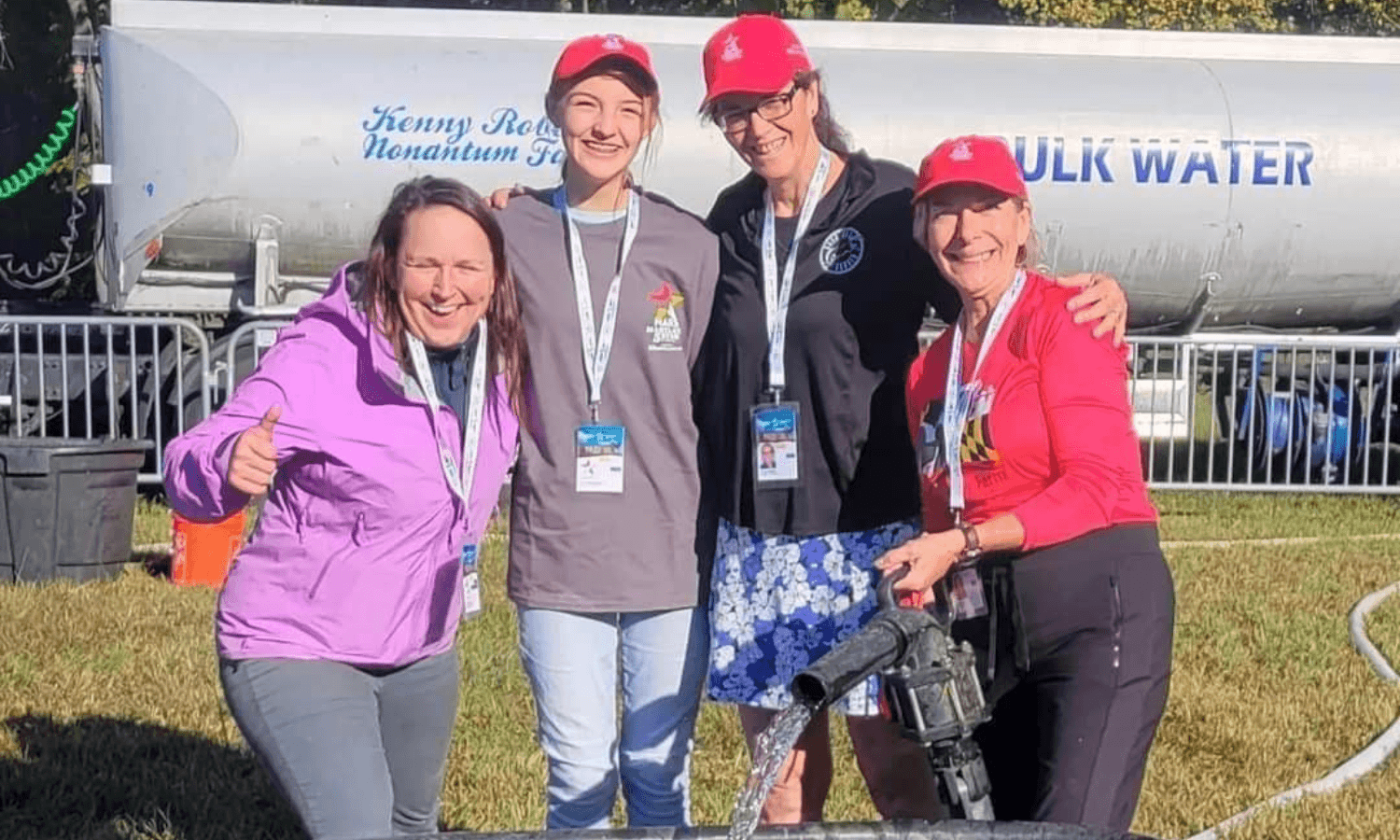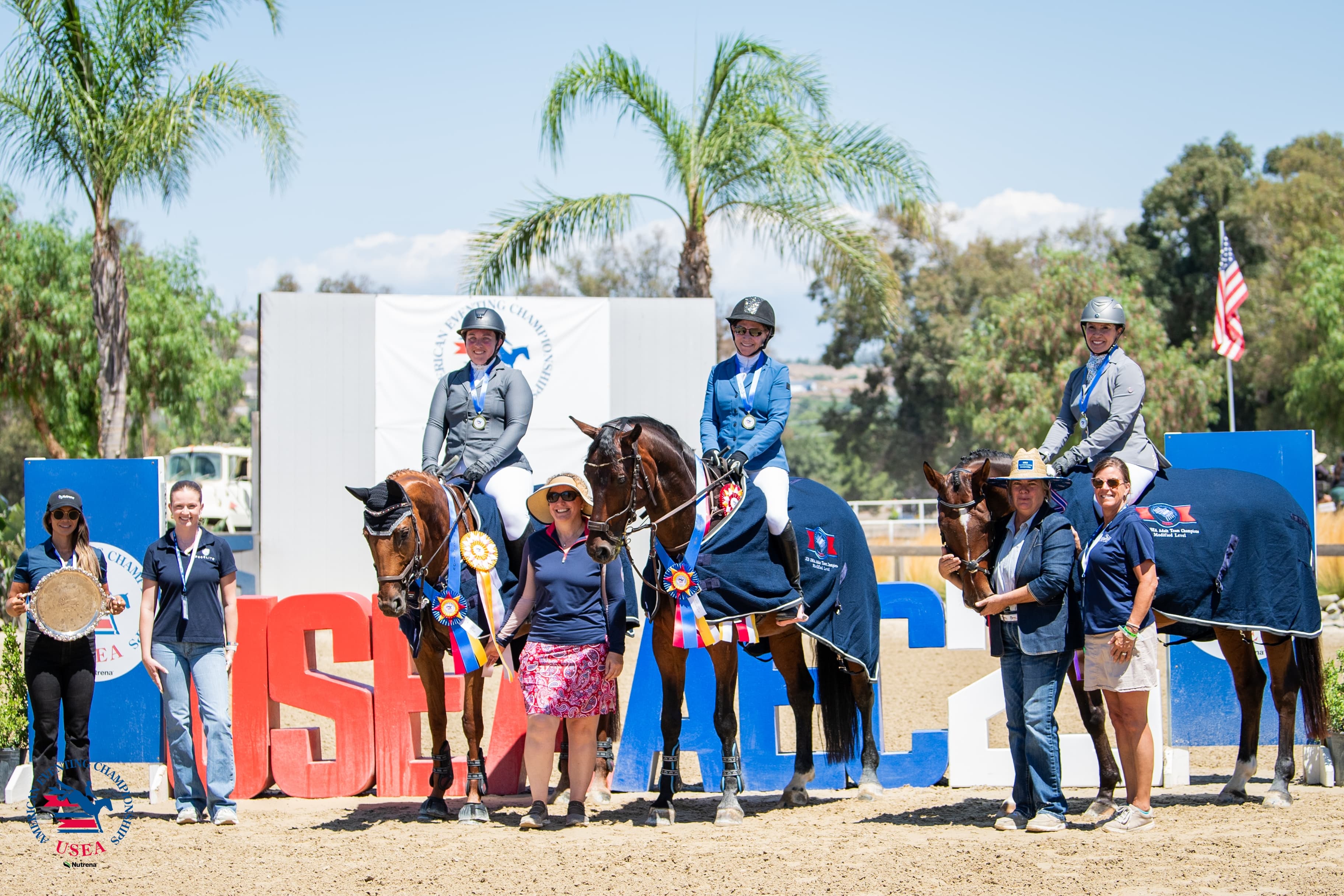Volunteering in the Vet Box with Lauren Nethery

If we’re lucky, we will all have that one “horse of a lifetime” that makes us the riders we are; collects blue ribbons left and right; launches our careers; and teaches us more than we could ever imagine. With Perseverance (aka Percy) was that horse for Lauren Nethery. Percy and Nethery ascended the levels together through the top of the sport in the early 2000s, and this success was critical to Nethery’s ability to hang her own shingle as a trainer and coach. When Percy retired from upper-level competition in 2010, not chasing the big events every season meant that Nethery had a lot more time to begin giving back to the sport that she loves so dearly. She returned to Kentucky as a volunteer, occupying a variety of roles in the myriad divisions that depend on volunteers to operate: decorations, awards, grooming, and shuttles to name a few. Nethery finally settled on the vet box as her primary area of focus.
“I started doing the vet box because I couldn’t be everywhere on course at once, and I wanted to see everything that was happening. All the TVs are right there!” Nethery laughs, referring to the live feed cameras that are set up near the vet box. Now, along with Megan Carr, the Chief Vet Box Steward at Kentucky, Nethery helps to oversee the recruitment and coordination of volunteers for the event and also routinely works other FEI events like Maryland. She shared some insights from her 17 years of volunteering on the front lines of FEI events.
“The requirements for the vet box are variable in terms of the lower levels,” she says. “For the one through three-star events, a lot of times the vet box is more a tool for riders to support their own initiative.
Once it gets to the four and five-star level events, it turns into more of a compliance requirement where you have to go in it; you can’t leave until we tell you; and you have to meet certain thresholds in terms of temperature, pulse, and respiration. We TPR all of the horses and make sure that they’re cooling down appropriately, that their respiration is lowering like it should because we’d hate for you to get back to the barn and have your horse experience a cardiac event in his stall.”
Having volunteered at Kentucky every year for almost the past two decades, Nethery can attest to the fine-tuned precision of the vet box operations at that venue. “We have Kentucky dialed in,” she says. “We have the same vet box location all the time.
The course starts and ends approximately at the same place it has for years and years. We have the main vet that’s just assigned to the vet box that’s not roaming the course. They’re not trying to divide their time. The local vet clinics also normally assign several vets on course to be available in real-time if anything happens at a fence, and then one or two vets are stationed in the vet box for the entire competition. These vets in the box are also assisted by vet students or new vet grads.”
Nethery has a few pieces of advice for riders and their teams who might be preparing for their first FEI event in the new year and for whom the vet box might be a relatively new experience.
“At the lower levels, you’re definitely going to want to make sure you have anything you might need in terms of extra shoes or studs. Especially if it’s a long format, and you are going to the vet box between roads and tracks and cross-country. Your main goal there is just having extras of everything and being organized and helping the horse to cool off. But then once you come off of cross-country, across all vet boxes, you definitely want to be prepared for any minor injuries that might occur. [Be prepared] with small first aid things, any kind of ice boots or wraps. You obviously can’t stand the horse in ice at the vet box but you can wrap it on little frozen ice sheets and have some cold water wraps to help cool the horse off.
[You also need] numerous buckets – four to six buckets at least. Ideally, ice water in a couple and room temperature water in the others.”
Nethery shares that there is some controversy over the appropriate water temperature to use for horses coming into the vet box, and this conflict even garnered the name “Frozen Watergate” at Maryland this year. Some vets, she says, insist that the water should be icy while others believe the horses do not necessarily need to have ice water to cool off.
“Sometimes [icy water] can even cause them to tie up and cause them to be really tight in their back end.”
To play it safe, Nethery suggests that having both water options is advisable.
“Generally, when a four or five-star competitor sends their groom or when they personally come to the vet box, they’re going to decide what area they want to be in. Usually, an hour or two before the horse is on course, they’re going to set up their buckets so that the horse can walk between them – maybe a six-foot square with a bucket in each corner. And then they’ll have scrapers; depending on the weather, they’ll have some kind of sheet to help the horse recover from being on course; and they’ll have sponges and the tools and materials to remove studs and ice legs.”
Nethery admits that in her years of working the vet box, she has experienced moments of tension and controversy – for example, when navigating the politics and details of the blood rule. The stresses of working at an FEI event are very real. “It’s definitely a labor of love,” Nethery says. In addition to the costs of traveling to events, “a lot of times we’re even coming out of our own pocket to ensure that we have all the materials that we need.” For Nethery, though, the benefits and pleasures of volunteering far outweigh the stresses and challenges, and quite often, it is the most intangible rewards of the work that keep her coming back year after year. The support of the management at these events – especially Megan Carr in Kentucky and Bonnie LaMonte in Maryland - makes it impossible to leave.
“There’s nothing like the emotion of somebody coming off their first five-star or four-star or any star!” she gushes. “It gives me goosebumps just talking about it. I never get tired of seeing that emotion and that elation and the gratitude for what the horse has done for you. It’s really great to see those riders succeed, especially if they’ve tried to get around Kentucky a couple of times. It never ceases to make me tear up in the vet box, and I’m so, so proud of them and so excited for them to know that they’re never going to forget that moment for the rest of their lives.”
As for the long, hard hours, Nethery affirms that for both Maryland and Kentucky, volunteers are put on half-day shifts so that nobody is asked to labor non-stop for eight hours at a time. She emphasizes that volunteering does not have to be a full-day commitment.
“I want everybody to know that if you’re anywhere near an event of any kind – even if you can only give a couple of hours of your time - every tiny little bit helps. It doesn’t seem like helping for an hour or two would matter, but it matters tremendously. With a little bit of generosity from a lot of people, not only will events continue to prosper but you’ll even help our little sport grow and improve. When you volunteer, you’ll get swag; you’ll get free tickets to the event; you’ll get up close and personal with the stars of the sport! And you might even learn a thing or two.”
About the USEA Volunteer Incentive Program
Volunteers are the lifeblood of our sport, the unsung heroes, and the people who make it possible to keep the sport alive. In efforts to recognize the dedication, commitment, and hard work that volunteers put into eventing, USEA formed the Volunteer Incentive Program (VIP) in 2015. In 2017, an online management portal was designed for volunteers, organizers, and volunteer coordinators at EventingVolunteers.com (available as an app for iOS and Android).
Volunteer incentives include national and area recognition, year-end awards with ribbons, cash prizes, and trophies, a top ten USEA Volunteer leaderboard, and a Volunteer of the Year award which is given to the volunteer who tops the leaderboard by accumulating the most volunteer hours over the USEA competition year. Click here to learn more about the USEA Volunteer Incentive Program.















